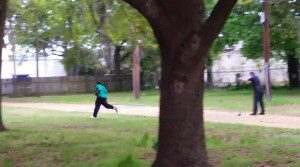 Like many others, I watched the video of South Carolina police officer Michael Slager shooting Walter Scott while he was running away. For me, the most chilling part of the video was when Officer Slager stood over Mr. Scott as he was dying and said, “Put your hands behind your back” over and over, as though it was an entirely normal police procedure presumably so that he could document this verbalization in his police report. Not knowing that he was being filmed, he then planted his stun gun next to the victim’s body in order to construct a false narrative about what had happened. What if there had been no cell-phone video and only God had been watching? Why did Officer Slager think nothing of his profound abuse of the truth and disrespect for God’s honor?
Like many others, I watched the video of South Carolina police officer Michael Slager shooting Walter Scott while he was running away. For me, the most chilling part of the video was when Officer Slager stood over Mr. Scott as he was dying and said, “Put your hands behind your back” over and over, as though it was an entirely normal police procedure presumably so that he could document this verbalization in his police report. Not knowing that he was being filmed, he then planted his stun gun next to the victim’s body in order to construct a false narrative about what had happened. What if there had been no cell-phone video and only God had been watching? Why did Officer Slager think nothing of his profound abuse of the truth and disrespect for God’s honor?
In the Old Testament of the Bible, a phrase that gets used over and over again is the “fear of the Lord.” It’s treated as a positive attribute. Proverbs 1:7 says that “the fear of the Lord is the beginning of wisdom.” I realize that such a concept is offensive to today’s sensibilities. But after studying this Biblical concept extensively, I have come to the conclusion that it doesn’t so much mean being afraid of God as it means having such respect for God that you act with complete integrity regardless of what you can get away with doing. When people fear God, they do not steal when nobody’s looking; they do not mistreat people who have less power than they do; they do the right thing without expecting to get a reward for doing so.
The Biblical fear of the Lord means more than merely trying your best to treat other people well and avoid causing harm. It means that the truth matters to you for the sake of truth itself. It means that you actually care about honor. As much as I’m a student of postmodern thought and recognize that my access to genuine objectivity is always tainted by my conscious and subconscious agendas, I finally have to recognize that there is a real truth to my life which I can either honor or cynically disrespect. Every time I am deliberately dishonest, I am mocking God and corrupting my soul just a little bit more than it already was.
I don’t think that our age is necessarily less truthful than other ages. Politicians and authority figures have always had the ability to give God the finger and abuse their power. I imagine that there was a lot more police brutality last century than there is today. I suppose that the difference is that our media and technology today make it so that we are constantly bombarded by the scandals of abusive authority figures. And all the meta-layers of public relations analysis in our thoroughly stagecrafted world make it almost impossible to believe that anyone is straightforwardly honest anymore. For a person to actually live with integrity in our postmodern landscape is almost as rare and embarrassing as people who are still virgins when they graduate from college. It’s so easy to decide that since nobody else is doing it, why should I?
I guess I’ve been convicted by my own response to the scandals of our world. It costs me very little to retweet tweets about police brutality, corruption, and other manifestations of white supremacy. I think that opening the eyes of people in our society to the very real violence of systemic racism and other evil social forces is important and legitimate work. But the question I’ve been led to consider is what work am I willing to do on myself (that isn’t merely me congratulating myself for owning up to my privilege and racism unlike other people, etc).
I’ve been reading an excellent book called Community: the Structure of Belonging by a guy named Peter Block. He talks about the imp0rtance of changing our conversations by asking questions that elicit true accountability and commitment rather than trying to figure out who to blame for our problems. Maybe the best act of protest against a lack of integrity on the part of authority figures in our world is for me to live with integrity. Not to the exclusion of marches, vigils, manifestos, and retweets, but as a means of actually putting my own skin in the game. I realize this sounds very lame and naive. If somebody else said it, I would probably roll my eyes and say, “Stop being such a Boy Scout!” But why shouldn’t we say that every trivial act of honesty is actually a mini-revolution against a fundamentally corrupt world?
There’s one last thing I should say about the fear of God. Christians believe that Jesus’ crucifixion is the most perfect revelation of God. If we actually fear God, then the one that we fear is the one with the bloody, suffocating body whose ultimate power was deceptively powerless against the brutality of empire. The one thing that we should be afraid of doing is sticking another nail in Jesus’ flesh every time we participate in the world’s dishonesty, every time we give our allegiance to a reality that makes it so that people can’t breathe just like Jesus couldn’t breathe on the cross.
Jesus’ dialogue with Pilate right before his crucifixion in John 18 delineates the true battle-lines in our world. He says to Pilate, “For this I was born, and for this I came into the world, to testify to the truth. Everyone who belongs to the truth listens to my voice.” And Pilate’s response is to ask him, “What is truth?” When truth and power met, truth won even though it seemed like power did. But we still prefer power to truth 2000 years later.












